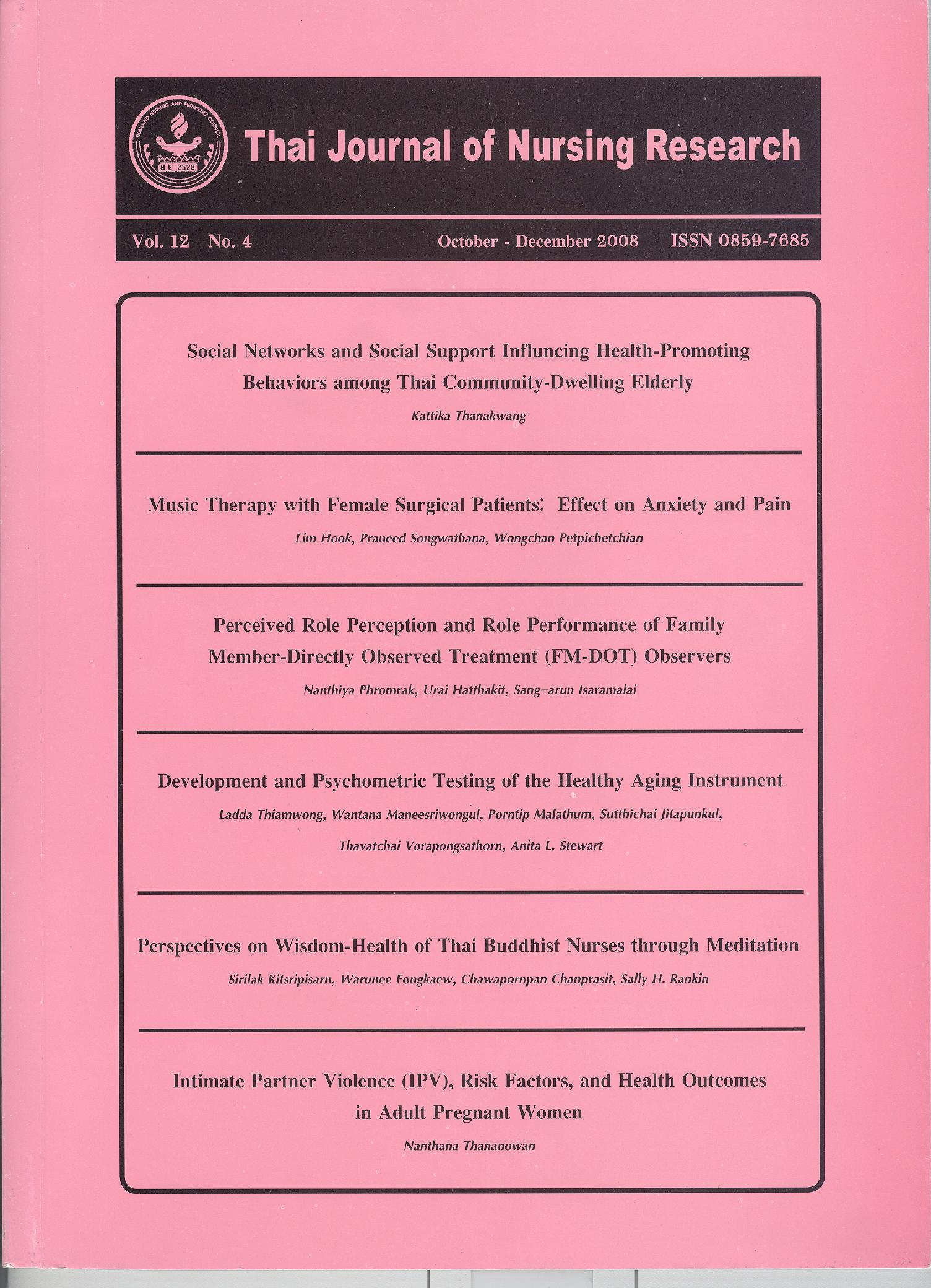Intimate Partner Violence (IPV), Risk Factors, and Health Outcomes in Adult Pregnant Women
Keywords:
การตั้งครรภ์, อายุน้อย, ความรุนแรง, สุขภาพ, ความเครียดAbstract
บทคัดย่อ
ความรุนแรงที่เกิดจากคู่สมรสขณะตั้งครรภ์จัดเป็นปัญหาสำคัญต่อสุขภาพ จากการวิจัยเรื่องความรุนแรงต่อสตรีในประเทศสหรัฐอเมริกาพบว่า สตรีที่มีอายุน้อยจะมีความเสี่ยงต่อการถูกกระทำในวัยเด็กหรือถูกทำร้ายโดยคู่สมรสมากกว่าสตรีที่มีอายุมาก อย่างไรก็ตาม การวิจัยเรื่องความรุนแรงดังกล่าวในสตรีตั้งครรภ์ที่มีกลุ่มอายุแตกต่างกันในประเทศไทยยังมีจำนวนน้อย วัตถุประสงค์ของการวิจัยเชิงสำรวจภาคตัดขวางนี้เพื่อเปรียบเทียบความแตกต่างของความชุกของความรุนแรง ปัจจัยเสี่ยง และผลต่อสุขภาพในกลุ่มสตรีตั้งครรภ์ที่มีอายุน้อยกว่าหรือเท่ากับ 25 ปี (กลุ่มที่มีอายุน้อย) กับกลุ่มสตรีตั้งครรภ์ที่มีอายุมากกว่า 25 ปี (กลุ่มที่มีอายุมาก) กลุ่มตัวอย่างเป็นสตรีตั้งครรภ์จำนวน 600 คน ที่มาฝากครรภ์ ณ หน่วยฝากครรภ์ของโรงพยาบาลมหาวิทยาลัยแห่งหนึ่งเพื่อทำการตอบแบบสอบถาม ผลการวิจัยพบว่า สตรีตั้งครรภ์ในกลุ่มที่มีอายุน้อย (n=296) มีความชุกของความรุนแรงที่เกิดจาก คู่สมรสทางด้านร่างกาย ทางเพศ และทางจิตใจขณะตั้งครรภ์สูงกว่าสตรีตั้งครรภ์ในกลุ่มที่มีอายุมาก (n=304) นอกจากนี้ สตรีตั้งครรภ์ในกลุ่มที่มีอายุน้อยมักจะไม่มีการวางแผนการตั้งครรภ์และไม่ต้องการบุตรในครรภ์ ใช้สารเสพติด และมีประวัติเคยถูกทำร้ายทางกายและทางเพศในวัยเด็กมาก่อนมากกว่าสตรีตั้งครรภ์ในกลุ่มที่มีอายุมาก สตรีตั้งครรภ์ที่ถูกทำร้ายในกลุ่มที่มีอายุน้อยมักมีการปฏิบัติตัวในขณะตั้งครรภ์ที่ไม่เหมาะสม (รับประทานอาหารที่ไม่เป็นประโยชน์หรือนอนหลับพักผ่อนไม่เพียงพอ และอื่นๆ) มีความเครียดสูง ได้รับการสนับสนุนทางสังคมน้อย และรู้สึกมีคุณค่าในตัวเองต่ำกว่าสตรีตั้งครรภ์ที่ถูกทำร้ายในกลุ่มที่มีอายุมาก ผลการวิจัยชี้ให้เห็นความจำเป็นในการคัดกรองความรุนแรงที่เกิดจากคู่สมรสขณะตั้งครรภ์ในสตรีตั้งครรภ์ที่มีอายุน้อย (อายุน้อยกว่าหรือเท่ากับ 25 ปี) เพราะความรุนแรงก่อให้เกิดผลเสียต่อสุขภาพขณะตั้งครรภ์ได้เป็นอย่างมาก
คำสำคัญ : การตั้งครรภ์ อายุน้อย ความรุนแรง สุขภาพ ความเครียด
Abstract
Intimate partner violence (IPV) during pregnancy is a major public health concern. In the U.S., research on violence against women has shown that younger age is a consistent risk factor for experiencing child abuse and perpetrating IPV. However, in Thailand, little is known about IPV in adult pregnant women in different age group. The purpose of this descriptive cross-sectional survey was to compare the prevalence of IPV, risk factors, and health outcomes between the adult pregnant women who were at the ages of 25 (the young age group) and at the ages of > 25 (the old age group). A convenience sample of 600 adult pregnant women from a university hospital was recruited during their antenatal clinic visits to complete a set of structured questionnaires. The results indicated that pregnant women in the young age group (n=296) reported higher prevalence of physical, sexual, and emotional IPV during pregnancy than pregnant women in the old age group (n=304). In addition, pregnant women in the young age group were more likely to have unplanned and unwanted pregnancy, drug abuse, and a history of child physical and sexual abuse than pregnant women in the old age group. Abused pregnant women in the young age group were more likely to engage in negative health practices during pregnancy (neither eating healthy food nor have enough sleeping during their pregnancy, etc), lower social support and self-esteem than abused pregnant women in the old age group. Results demonstrate a need for screening of IPV in young adult pregnant women (the ages of 25) because IPV could lead to many negative health outcomes during pregnancy.
Keywords: intimate partner violence, pregnancy, risk factors, health outcomes
Downloads
How to Cite
Issue
Section
License
Copyright: The Pacific Rim International Journal of Nursing Research, Thailand Nursing & Midwifery Council has exclusive rights to publish, reproduce and distribute the manuscript and all contents therein.








.png)



